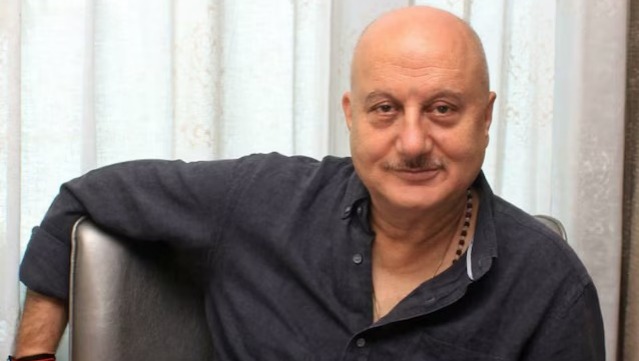Anupam Kher, a celebrated Indian actor known for his versatile roles in both Bollywood and international cinema, recently shared a rather amusing yet eye-opening experience from his life. This incident revolved around a car theft that took place while he was engaged in prayer at a temple. Kher’s storytelling not only evokes laughter but also provokes thought on themes of trust, vulnerability, and the unexpected twists life can throw our way. It was a typical day for Kher as he made his way to a local temple for prayer, seeking solace and tranquility in the bustling chaos of daily life. Like many, he saw the temple as a sacred space—a place to connect with something greater than himself. The routine was familiar, and the atmosphere was serene, filled with the soothing sounds of prayer bells and chants. As he arrived, he parked his car in what he believed was a secure spot and made his way inside. For Kher, this time of prayer was not just a ritual; it was a necessary escape from the pressures of his professional life. However, little did he know that a comical misadventure was about to unfold. While he was inside, deeply immersed in his prayers, a thief saw an opportunity. Unbeknownst to Kher, his vehicle had become the target of a brazen theft. The thief, seemingly unbothered by the sacred environment, managed to drive away with Kher’s car, leaving him blissfully unaware. When Kher finished his prayers and stepped outside, the first thing he noticed was the unusual emptiness of the parking area. A sinking feeling washed over him as he searched for his car, only to come to the stark realization that it was gone. This sudden shift from a spiritual high to a state of disbelief was jarring. Kher humorously recounted how he stood there for a moment, processing the absurdity of the situation. How could someone steal a car right outside a temple? This paradox stirred a blend of emotions—anger, frustration, and, eventually, a sense of humor about the absurdity of it all. Kher promptly reported the theft to the local police, expecting a serious approach to the situation. However, upon recounting the circumstances of the theft—particularly the fact that it occurred while he was praying—the officers couldn’t help but chuckle. Kher described how their laughter added a surreal layer to the incident, highlighting how life often takes unexpected turns that are both frustrating and hilariously ironic. The police officers, while they maintained professionalism, found the situation oddly humorous, and their reactions provided Kher with some relief. Instead of wallowing in despair, he joined in on the laughter, realizing that sometimes humor can be the best response to life’s unpredictability.
Anupam Kher Recalls How His Car Was Once Stolen While He Prayed At A Temple: ‘Police Couldn’t Stop Laughing…’
Kher’s story resonates on deeper levels than just a humorous anecdote. It brings forth essential themes about trust and vulnerability in a world where security is often an illusion. By sharing his experience, Kher underscores how we often place our trust in certain places—be it a temple, our community, or even in our possessions. The act of prayer, in many ways, represents a deep trust in the universe or a higher power to keep us safe and secure. However, Kher’s experience serves as a reminder that vulnerability is part of the human experience. While we may seek safety in sacred spaces, life can be unpredictable, and sometimes, our expectations do not align with reality. This incident allows for a reflection on how we respond to unexpected challenges. Do we let them shatter our peace, or do we find ways to laugh and move forward? In Kher’s case, embracing humor was a powerful coping mechanism. The laughter shared with the police not only lightened the mood but also created a bond through a shared, albeit unusual, experience. Humor has long been recognized as a therapeutic tool, helping individuals deal with stress, anxiety, and challenging situations. By choosing to laugh at the absurdity of his experience, Kher exemplified resilience, turning a potentially negative situation into a source of joy and connection. This approach highlights an important life lesson: while we cannot control what happens to us, we can control how we respond. Embracing humor, even in difficult situations, can lead to personal growth and deeper connections with those around us. Kher’s experience also invites a broader conversation about safety in public spaces. The fact that a car could be stolen so brazenly raises questions about security measures in places of worship and community. How can we ensure that sacred spaces remain safe for all? This incident highlights the need for a balance between faith and practical safety measures. As communities, it is crucial to foster environments where individuals feel secure, both physically and emotionally. Kher’s light-hearted recounting of his experience serves as a gentle nudge for us to reflect on these societal responsibilities. Anupam Kher’s story of a stolen car during prayer is more than just an amusing anecdote; it’s a reflection on life’s unpredictability, the importance of humor in overcoming adversity, and the need for trust in our daily lives. As Kher navigated the challenges of his day with laughter and grace, he reminded us all that joy can often be found in the most unexpected places—even in the face of theft. In sharing this experience, Kher not only entertained his audience but also offered valuable insights into the human condition. It’s a reminder that life’s ironies are best met with a smile and a resilient spirit, urging us all to cherish the moments of laughter amidst life’s many surprises.

